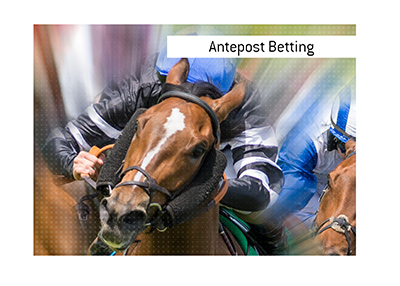A Look at the Pros and Cons of Antepost Betting

Betting Action Starts Here!
First off - what exactly is "ante-post betting"?
Ante-post betting occurs when you bet on a horse race a considerable period of time before the race gets underway.
This can be a day, a week or even a month.
 In most cases, people will bet on a horse race on the day of the event.
In most cases, people will bet on a horse race on the day of the event. After all, most people want to know exactly which horses are going to be racing, if their chosen horse is healthy, how the weather is looking, etc.
So, in the majority of cases, these people will visit the betting window (virtual or otherwise) a short time before the race begins, as they are armed with the most current information possible.
With "ante-post betting", you are placing a bet on a race despite not knowing all of the possible information.
In fact, your horse may not even be in the race!
-
The biggest "pro" of ante-post betting is that you will receive better odds for your chosen horse, as anything could potentially happen before the race takes place.
Your horse could get hurt.
Your horse might not qualify for the race.
Your horse might not race well in the type of weather that the race is expecting.
These are all risks, and in all of these cases, you'd be out of luck if you had placed an "antepost" wager.
In fact, the only time that a book might refund your wager is if your horse is "balloted out" of the race, meaning that a higher-ranked horse was chosen instead of them, even though your horse was intent on racing.
Better odds are available with "antepost" betting, but there is more that could go wrong, causing you to lose your bet.
-
The biggest "con" to ante-post betting is obviously that you stand a much higher chance of losing your wager, as any number of factors could result in your horse potentially not even making the race.
If you bet on a horse a month ahead of time, and they end up getting injured, or if they don't qualify for the race, you'll lose your bet.
This is the danger of antepost betting.
-
Let's say that there is a horse called "Blue Boy" that you really like, and they are set to race in the Grand National.
A month out from the event, Blue Boy has odds of 7.50 to win the race.
You decide to play a £100 wager on Blue Boy to win at 7.50, meaning that you stand to win a profit of £650 if he wins the race.
On the day of the race, "Blue Boy" has odds to win of 5.50.
The reason?
The risks of Blue Boy not racing in the Grand National have disappeared. He did not get injured. He qualified for the event. Everything is as it should be.
In exchange for taking on the extra risk of Blue Boy not being in the race, you stand to win an extra £200.
These are the risks and rewards of "ante-post betting".

